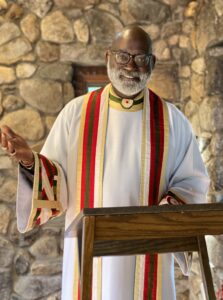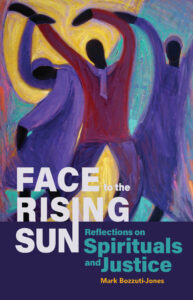Spirituals, songs of abiding faith passed down by African Americans through the centuries, offer a remarkable view of resilience, courage, and love. Formed in the crucible of fire, these songs express the suffering and horror of slavery as well as the love of God and the promise of a better future.
 Author Mark Bozzuti-Jones explores the modern-day lessons of these Spirituals with scripture readings, daily devotions, and questions for reflection. The Rev. Dr. Mark Francisco Bozzuti-Jones is an Episcopal Jamaican priest at Trinity Church Wall Street in New York City. A former Jesuit priest, Mark has missionary experience in Belize, Brazil, and Guyana. He is an avid reader, award-winning author, and speaker, and has taught at elementary and university levels. Explore Fr. Mark’s book and writing process in this author Q&A.
Author Mark Bozzuti-Jones explores the modern-day lessons of these Spirituals with scripture readings, daily devotions, and questions for reflection. The Rev. Dr. Mark Francisco Bozzuti-Jones is an Episcopal Jamaican priest at Trinity Church Wall Street in New York City. A former Jesuit priest, Mark has missionary experience in Belize, Brazil, and Guyana. He is an avid reader, award-winning author, and speaker, and has taught at elementary and university levels. Explore Fr. Mark’s book and writing process in this author Q&A.
How did the idea for this book develop?
The idea of this book emerged as I witnessed the protests for justice and peace organized by the Black Lives Matter Movement in 2020. I joined many of these protests and could not help but think that protesting for justice has always been part of the African American story and history. The more I observed the marches, the more I thought of the Spirituals as a legacy of protests. For me, the Spirituals entreat this generation to persevere in the struggle for justice. The Spirituals show that the celebration of the Black spirit and the fight for justice are not only spiritual, but psychological, political, and cultural, too.
What is your hope for this book?
I hope this book will inspire African Americans, and everyone who reads it, to keep the faith, to commit to justice and peace, and to support communities that seek justice. I pray that readers will deepen their commitment to their faith and let their voices ring out on behalf of justice. The Spirituals remind us that we are called to be true to who we are; they invite a commitment to justice, peace, liberation, and respect.
 Is there a spiritual that was particularly memorable or you during your childhood?
Is there a spiritual that was particularly memorable or you during your childhood?
“Nobody knows the troubles, I’ve seen; nobody knows but Jesus.” Whenever a human being suffers, God suffers. What we do to the least of our brothers and sisters, we do to Jesus. Jesus knows our suffering, because Jesus also suffered. In his suffering, Jesus remained faithful to God, and that is what the Slaves did. The Spirituals show that the Slaves identified with Jesus and believed that Jesus identified with them. My great epiphany came in realizing that the Slaves saw themselves in “the Son of Man is to be handed over to men and they will kill him.”
What about a spiritual that is especially meaningful in your life today?
“We Shall Overcome” holds tremendous meaning in my life today and always will. This affirmation of strength and hope is the Apostles and Nicene Creeds for me. I believe in these words; they fully express my faith – and they make all the difference.
The book includes several original poems that discuss the experience of racism in America today. What was the experience of writing those poems like?
The poetry in this book is one of the ways I dialogue with the Spirituals. When we hear the Spirituals; we are called to “inwardly digest” and give new voices to them. These poems are my attempts to show that the Spirituals live forever, and the Black Lives Matter Movement is integrally connected to the Spirituals, a reflection of their deep longing.
Where do you typically write?
Typically, I write at a desk at home. This desk is close to a window, because I always believe that writing is about looking out into the world.
What was your favorite part of writing this book?
Recalling my experience of growing up in Jamaica was my favorite part of writing this book. Knowing that Jamaicans identify with the Spirituals gives me tremendous comfort and joy. In addition, I loved the way the Scripture selections complemented and deepened their messages.
Is there anything else you’d like readers to know?
I would love folks to know that the Slaves were not only objects or victims but deeply spiritual and faithful people. I would love people to know that the Slaves were well educated and sophisticated in their usage of poetic form to convey the complex realities of trust in the face of oppression, brutality, and all aspects of slavery. I would love people to know that many of the Slaves knew the power of remaining faithful and took their religious beliefs very seriously.
Face to the Rising Sun is available on the Forward Movement website. Read a sample or order your copy today.



